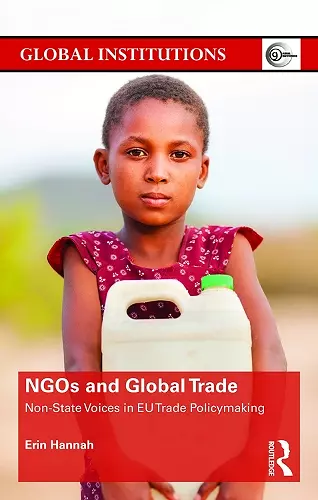NGOs and Global Trade
Non-state voices in EU trade policymaking
Format:Hardback
Publisher:Taylor & Francis Ltd
Published:11th Feb '16
Currently unavailable, and unfortunately no date known when it will be back
This hardback is available in another edition too:
- Paperback£49.99(9781138477643)

In a deeply iniquitous world, where the gains from trade are distributed unevenly and where trade rules often militate against progressive social values, human health, and sustainable development, NGOs are widely touted as our best hope for redressing these conditions. As a critical voice of the poor and marginalized, many are engaged in a global struggle for democratic norms and social justice. Yet the potential for NGOs to bring about meaningful change is limited. This book examines whether improvements in participatory opportunities for progressive NGOs results in substantive and normative policy change in one of the major trading powers, the European Union.
Hannah advances a constructivist account of the role of NGOs in the EU’s trade policymaking process. She argues that NGOs have been instrumental in providing education, raising awareness, and giving a voice to broader societal concerns about proposed trade deals, both when they take advantage of formal participatory opportunities and when they protest from the streets and in the media. However, the book also highlights how NGO inputs are mediated by the social structure of global trade governance. Epistemes—the background knowledge, ideological and normative beliefs, and shared assumptions about how the world works—determine who has a voice in global trade governance.
Showing how NGOs succeed only when their advocacy conforms broadly to the dominant episteme, this book will be of value to scholars and students with an interest in NGOs and international trade negotiations. It will also be of interest to policymakers, national trade negotiators, government departments, and the trade policy community.
This is an outstanding book, one of the clearest analyses of NGOs trying to influence the current world of multilevel governance. It is must reading for any student of the global trade system, the EU, and global governance in general.' -Craig Murphy, Department of Conflict Resolution, Human Security, and Global Governance, The University of Massachusetts Boston, USA
‘Erin Hannah sheds much light on the complex role of non-governmental organizations in promoting progressive policies across integrating markets. Based on extensive research inside contemporary Europe, her accessible analysis highlights the limits of the most ambitious advocacy strategies. Pushing those limits remains possible, but success depends upon subtlety, persistence, and patience. NGO leaders, and anyone interested in their important work, should read this splendid book.’ - Louis W. Pauly, Professor of Political Science, University of Toronto, Canada
'This important book reaches a dismal conclusion – wildly successful NGO campaigning in the EU has only marginally impacted on trade policy. But, it is not a counsel of despair – potential routes out of this global epistemic logjam are identified and elaborated. Essential reading for anyone interested in understanding the contemporary limits to NGO campaigning.' -David Hulme, Professor of Development Studies, University of Manchester, UK
This is an outstanding book, one of the clearest analyses of NGOs trying to influence the current world of multilevel governance. It is must reading for any student of the global trade system, the EU, and global governance in general.' - Craig Murphy, Department of Conflict Resolution, Human Security, and Global Governance, The University of Massachusetts Boston, USA
‘Erin Hannah sheds much light on the complex role of non-governmental organizations in promoting progressive policies across integrating markets. Based on extensive research inside contemporary Europe, her accessible analysis highlights the limits of the most ambitious advocacy strategies. Pushing those limits remains possible, but success depends upon subtlety, persistence, and patience. NGO leaders, and anyone interested in their important work, should read this splendid book.’ - Louis W. Pauly, Professor of Political Science, University of Toronto, Canada
'This important book reaches a dismal conclusion – wildly successful NGO campaigning in the EU has only marginally impacted on trade policy. But, it is not a counsel of despair – potential routes out of this global epistemic logjam are identified and elaborated. Essential reading for anyone interested in understanding the contemporary limits to NGO campaigning.' -David Hulme, Professor of Development Studies, University of Manchester, UK
'NGOs and Global Trade powerfully challenges assumptions that 'civil society' always paves the way to a more equitable global economy. Yet out of this sobering analysis also come pointers for more progressive trade politics in the future.' - Jan Aart Scholte, Professor in the School of Global Studies, University of Gothenburg, Sweden
ISBN: 9780415712637
Dimensions: unknown
Weight: 294g
170 pages